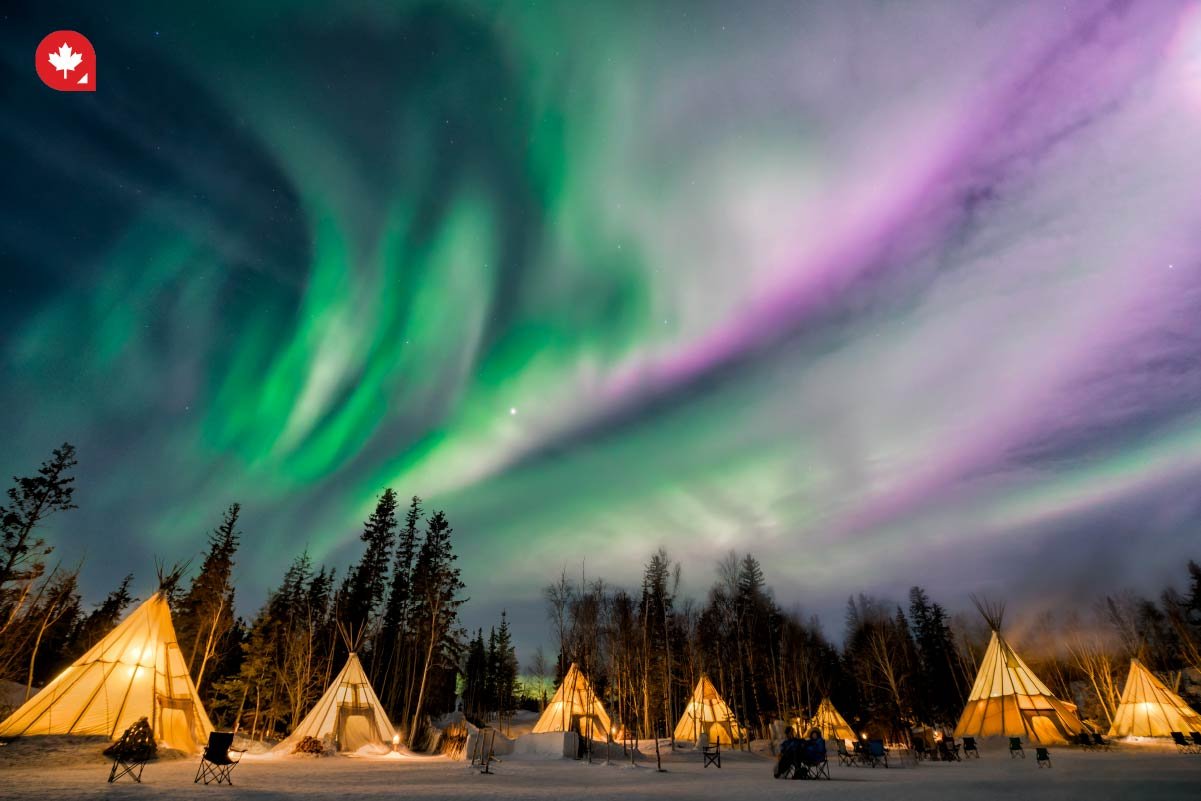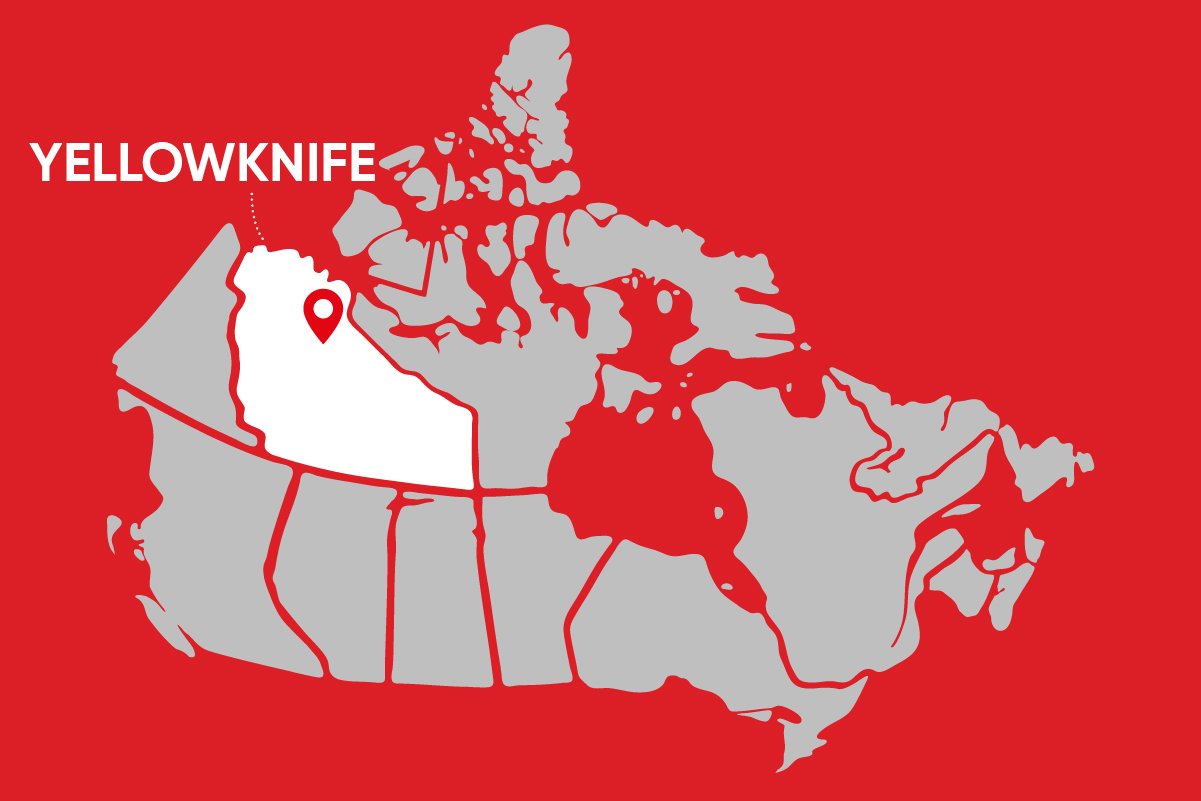The immigrant demographics in Yellowknife paint a rich tapestry of stories, experiences, and contributions. As individuals from various corners of the globe call this northern gem their home, the city becomes a microcosm of multiculturalism. This is reflected by the many immigrants hailing from places like India, the Philippines, Nigeria, and the United Kingdom.
Obtain a spot as a permanent resident in Yellowknife by gaining an understanding of what to expect living in the coldest capital in Canada with our city guide!
About Yellowknife

Founded in 1935 a year after gold was discovered in the area, Yellowknife got its name from the Yellowknife band of Athabascan Indians. In the early years of World War II, the city’s economy suffered as the demand for gold declined.
A second major gold discovery in 1945 led to the operation of several large mines. Diamond mining is also prominent in the city’s economy since diamond reserves were discovered in the surrounding region in the mid-1990s. Recently, tourism has assumed growing importance in Yellowknife’s local municipal economy.
Yellowknife is the largest community and chief administrative, commercial, and educational center in the Northwest Territories.
Where is Yellowknife on the Map?
Yellowknife is in the Northwest Territories, one of Canada's northernmost regions. It rests at a latitude of 62.45° N and a longitude of 114.38° W. Yellowknife lies on the north shore of Great Slave Lake, approximately 5 miles (8 km) south of the mouth of the Yellowknife River.

Climate in Yellowknife
According to the Koppen Classification system, Yellowknife experiences a subarctic climate characterized by long, cold winters and short, mild summers. The city's proximity to the Arctic Circle ensures Yellowknife enjoys long daylight hours during the summer months, with the sun barely setting in June and July.
In contrast, winter brings extended periods of darkness, with only a few hours of daylight each day. The average temperatures vary between -21°F (-29.44°C) and 71°f (21.67°C), according to Weather-spark.
Work and Jobs in Yellowknife
Yellowknife offers a range of job opportunities across various industries. Mining, natural resources, and government services drive the city’s economy. Furthermore, the government provides employment opportunities in areas such as:
- Administration,
- Education,
- Healthcare, and
- Law enforcement.
Yellowknife also has a thriving tourism industry, with hospitality, tourism services, and outdoor recreation jobs. With a low unemployment rate of 4.5% according to the Northwest Territories (NWT) Bureau of Statistics, your chances of finding a secure, permanent job in Yellowknife remain relatively high.
You can find employment among the following similar-paying jobs in Yellowknife. Information obtained from National Occupational Classification (NOC) and Canada’s Job Bank.
| Occupations in Yellowknife | Estimated Average Annual Salary in Yellowknife (CAD) | NOC codes |
|---|---|---|
| Senior Managers - Financial | 222,952.81 | 00012 |
| Advertising, Marketing, and PR Managers | 136,745.76 | 11202 |
| Financial Auditors and Accountants | 128,706.79 | 11100 |
| Computer Programmers and Interactive Media Developers | 118,252.63 | 21230 |
| Drafting Technologists and Technicians | 111,339.36 | 22212 |
| Medical Laboratory Technologists | 96,067.85 | 32120 |
| Post-Secondary Teaching and Research Assistants | 67,541.41 | 41201 |
| Transport Truck Drivers | 79,503.55 | 73300 |
| Early Childhood Educators and Assistants | 63,567.60 | 42202 |
| Cooks | 53,006.07 | 63200 |
Cost of Living in Yellowknife

While Yellowknife offers excellent job prospects, it's important to consider the cost of living in the city. As with any remote location, the cost of goods and services in Yellowknife can be higher compared to more urban areas in Canada.
However, it's worth noting that salaries in Yellowknife are generally higher compared to major Canadian Cities such as Toronto, Vancouver, and Montreal, helping to compensate for the higher living costs. This is reflected below with figures from Numbeo.com.
| Canadian Cities | Average Monthly Net Salary After Tax (CAD) |
|---|---|
| Yellowknife | 6,000.00 |
| Toronto | 4,599.00 |
| Vancouver | 4,087.19 |
| Montreal | 3,643.35 |
Furthermore, apartment rental costs in Yellowknife are more affordable than Vancouver’s or Toronto’s in and outside the city center, as exemplified below with information from Numbeo.com.
| Apartment Types | Average Monthly Rent in Yellowknife (CAD) | Average Monthly Rent in Toronto (CAD) | Average Monthly Rent in Vancouver (CAD) |
|---|---|---|---|
| 1 bedroom apartment inside the city center | 1,916.67 | 2,627.72 | 2,850.95 |
| 1 bedroom apartment outside the city center | 1,875.00 | 2,328.85 | 2,317.23 |
| 3 bedroom apartment inside the city center | 2,700.00 | 4,327.78 | 5,187.53 |
| 3 bedroom apartment outside the city center | 2,300.00 | 3,592.16 | 3,949.10 |
Neighborhoods in Yellowknife
Old Town
Old Town, nestled on the shores of Frame Lake, is a neighborhood that encapsulates Yellowknife's rich history and quaint charm. The colorful houses lining the narrow streets transport residents and visitors to a bygone era. With eclectic boutiques, cozy cafes, and the historic Pilots' Monument offering panoramic views of the city.
Niven Laker
If you're looking for a tranquil escape, Niven Lake provides a serene residential haven. This neighborhood offers a mix of modern homes and apartment complexes, creating a peaceful retreat while remaining close to the city center. Residents can enjoy lakeside walks, green spaces, and the proximity to attractions like the Prince of Wales Northern Heritage Centre.
Kam Lake
Kam Lake, characterized by its industrial landscape, is a unique neighborhood that seamlessly integrates commercial and residential spaces. Home to various businesses, including light industrial enterprises, Kam Lake attracts a diverse community.
Range Lake
Nestled in the southeastern part of Yellowknife, Range Lake is a family-friendly neighborhood known for its suburban charm and proximity to educational institutions. With schools like Range Lake North School and École William McDonald Middle School, families find an ideal environment for raising children.
Transportation in Yellowknife
Yellowknife has a well-connected transportation network that makes it easy to get around the city and explore the surrounding areas.
Yellowknife Transit Service
The city's public transportation is efficiently managed by the Yellowknife Transit service, offering a network of buses that weave through key routes, providing an affordable and eco-friendly mode of travel. With buses equipped for accessibility, residents and tourists alike can comfortably explore the city, hopping on and off at notable landmarks.
Yellowknife City Cabs and Aurora Taxi
Taxis and ride-sharing services are also available for convenient transportation. Yellowknife offers a reliable taxi service, with companies like City Cabs and Aurora Taxi providing convenient transportation around the city. Whether you're heading to the airport, a local attraction, or simply need a ride to your destination, these taxi services ensure a prompt and comfortable journey.
Private Car Usage and Rental
If you prefer to drive, Yellowknife has a well-maintained road network, with highways connecting it to other parts of the Northwest Territories and beyond. Additionally, Yellowknife is a popular destination for cyclists, with bike lanes and trails throughout the city.
While Yellowknife currently does not have a train service within the city limits, the diverse transportation options, including buses and taxis, efficiently meet the needs of residents and visitors.
Things to Do in Yellowknife
Witness the Northern Lights Spectacle
Embark on a mesmerizing journey under the celestial dance of the Northern Lights. Yellowknife, renowned for its clear skies and optimal aurora borealis viewing conditions, offers a front-row seat to this natural wonder. Head to spots like the Aurora Village or Prelude Lake Territorial Park for a magical night of vibrant colors illuminating the northern sky.
Explore the Rich Heritage at the Prince of Wales Northern Heritage Centre
Immerse yourself in the cultural tapestry of Yellowknife by visiting the Prince of Wales Northern Heritage Centre. Home to a diverse collection of artifacts, exhibits, and displays, this museum showcases the rich history and traditions of the Northwest Territories.
Cruise the Great Slave Lake
Discover the scenic beauty of the Great Slave Lake, one of the largest freshwater lakes globally, through a captivating boat cruise. With its crystal-clear waters and stunning landscapes, the lake offers a serene escape from the hustle and bustle of everyday life.
Hike the Cameron Falls Trail for Panoramic Views
For outdoor enthusiasts, the Cameron Falls Trail presents an invigorating hiking experience with a rewarding payoff. This picturesque trail, located just outside Yellowknife, takes you through lush landscapes and culminates in stunning panoramic views of Cameron Falls.
Education in Yellowknife

Yellowknife is home to a range of educational institutions, offering quality education at all levels.
Elementary Education in Yellowknife
Catering to pupils between the ages of 5 and 11, elementary education lays the crucial groundwork for a child's academic journey. The Department of Education, Culture, and Employment (ECE) spearheads the administration of elementary education in Yellowknife, ensuring a standardized and quality learning experience for every child.
Primary Education in Yellowknife
As students progress, the next phase is primary education, targeting ages 12 to 14. Primary education in Yellowknife emphasizes a more diverse curriculum, fostering critical thinking and a deeper understanding of various subjects. The Northwest Territories Department of Education oversees primary education, ensuring a seamless transition from elementary to more advanced levels.
Secondary Education in Yellowknife
For students aged 15 to 18, secondary education becomes the focal point. The curriculum at this stage is tailored to individual career aspirations, providing a specialized and comprehensive education. The Yellowknife Education District No. 1 plays a pivotal role in the oversight of secondary education, collaborating with the Ministry of Education to ensure educational excellence.
Prominent colleges you can enroll in Yellowknife include Aurora College and Arctic College-Yellowknife. You can also obtain a university education at a nearby designated learning institution (DLI) such as Yukon University.
Immigrate to Yellowknife
If you are considering immigrating to Yellowknife, there are several immigration programs you can explore.
Express Entry System
The Express Entry system is a streamlined process for skilled workers who wish to immigrate to Canada permanently. It is designed to facilitate the selection and admission of candidates with the skills and experience needed in the Canadian labor market. The Express Entry system is divided into three main economic immigration programs:
Federal Skilled Worker Program (FSWP)
The Federal Skilled Worker Program is for individuals with skilled work experience in a specific occupation.
Federal Skilled Trades Program (FSTP)
The Federal Skilled Trades Program with skilled work experience in a specific trade.
Canadian Experience Class (CEC)
The Canadian Experience Class is for individuals with at least one year of skilled work experience in Canada.
Find out more about the Express Express system.
Northwest Territories Provincial Nominee Program (NTPNP)
The Northwest Territories Provincial Nominee Program (NTPNP) is a program that allows the Northwest Territories to provincially nominate individuals who have the skills and experience needed in the local labor market. Through this program, individuals can apply for permanent residency in the Northwest Territories, including Yellowknife.
Learn more about the Northwest Territories Provincial Nominee Program.
Homecare Provider Pilot (HCPP)
The Homecare Provider Pilot (HCPP) is a pilot program that allows foreign nationals to work as home care providers in the Northwest Territories, including Yellowknife. Under this program, eligible individuals can apply for a work permit to provide homecare services to individuals who require assistance with daily activities.
The HCPP is designed to address the growing demand for home care services in the Northwest Territories and provide opportunities for foreign nationals with experience in the field.
Find out more about the Home Care Provider Pilots.
Business Immigration
For individuals with an entrepreneurial spirit, Yellowknife offers business immigration programs that allow individuals to start or invest in a business in the city.
Self-employed Program
The Self-employed Program is for individuals who have the intention and ability to establish or purchase a business in Yellowknife and contribute to the local economy and employment rate.
Learn more about the Self-Employed programs.
Start-up Visa
The Start-up Visa Program is for individuals who have an innovative business idea and the support of a designated organization in Canada. They must also intend to permanently settle in Canada by either starting or buying an established business in Canada.
Find out more about the Start-up visa program.
FAQs
Are There Any Local Customs or Regulations I Should Be Aware of in Yellowknife?
Yellowknife, like any city, has its own set of customs and regulations that residents and visitors should be aware of. One important custom is respecting the land and indigenous culture. The Northwest Territories has a rich indigenous heritage, and it is important to be respectful of their traditions and customs.
What is the Best Time to Visit Yellowknife?
The best time to visit Yellowknife depends on your interests and preferences. If you are interested in experiencing the Northern Lights, the winter months from November to March offer the best chance of witnessing this natural phenomenon.
The summer months from June to August are ideal for outdoor activities and exploring the city's natural beauty. The fall season, from September to October, offers stunning autumn colors and milder weather.
Does Tourism Drive Up The Cost of Living in Yellowknife?
Tourism does have an impact on the cost of living in Yellowknife, particularly during the peak tourist season. The influx of visitors can increase the demand for goods and services, leading to higher prices in some cases.
However, it is worth noting that the tourism industry also provides employment opportunities and contributes to the local economy. While tourism may have some influence on the cost of living, it is not the sole determining factor.



